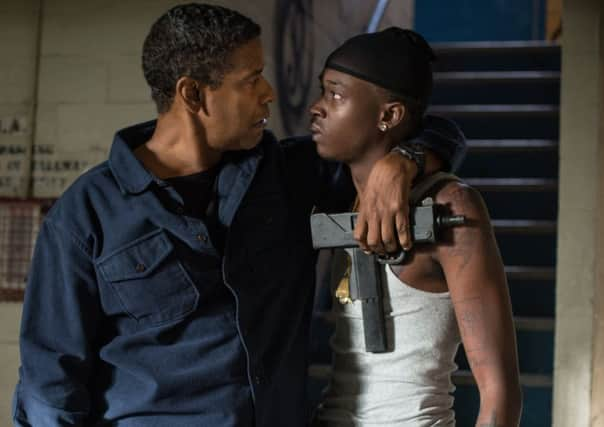Film reviews: The Equalizer 2 | The Eyes of Orson Welles | The Guardians


The Equalizer 2 (15) **
The Eyes of Orson Welles (12A) ****
The Guardians (15) ***
Given that Denzel Washington has never made a sequel before, it’s too bad he’s chosen to end his career-long pursuit of new material with The Equalizer 2, a film of such frustrating ineptitude it doesn’t even deserve the “Sequelizer” pun some critics have been applying to it. A follow-up to 2014’s already dire reboot of the barely remembered 1980s TV show, it once again squanders what should be a tough-to-mess-up premise by denying Washington a satisfying opportunity to unleash his inner bad-ass as former government agent turned peoples’ vigilante Robert McCall.
This is despite Washington having the charisma, the gravitas and the action movie chops to pull off the film’s rebranding of McCall – who was played in the TV show by the late Edward Woodward – as a sort of bookish Travis Bickle (he’s even working as an Uber-style taxi driver this time out). Still ploughing his way through his list of the 100 greatest books of all time, McCall is the sort of shadowy figure who dispenses eye-watering justice to drug dealers, kidnappers and coked-up bankers with reprehensible attitudes to women, then tempers his sociopathic impulses by reading a rare copy of Proust’s In Search of Lost Time and imploring the wayward teen graffiti artist (Moonlight’s Ashton Sanders) he’s trying to keep on the straight-and-narrow to read Ta-Nehesi Coates’s Between the World and Me.
Advertisement
Hide AdSuch idiosyncratic character details should make The Equalizer movies as distinctive and satisfying as Keanu Reeves’ sublime outings as the puppy mourning John Wick, but the film – once again directed by Washington’s frequent collaborator Antoine Fuqua (Training Day, The Magnificent Seven remake) – is an absolute slog, unable to decide if it wants to be a straight-up revenge thriller or a Bourne-style espionage movie about a highly skilled former agent trying to escape a dark past.
Shades of the latter are put into play with a plot thread involving Melissa Leo (returning from the first film) as an ex-CIA colleague of McCall’s who is investigating the possible murder-suicide of an asset and his family in Belgium. McCall is dragged back into the fray when bad guys associated with her operation show up in Boston to eliminate him, though whatever conspiracy is unfurling never quite takes shape thanks to the film taking our interest in McCall’s backstory for granted while doing virtually nothing to earn that interest in the first place. Thenceforth it cuts confusingly between various plot points and set-pieces, giving the whole film a disjointed feel that even the presence of Washington – playing McCall like a cross between the stern father from Fences and the vengeful bodyguard from Man on Fire – can’t smooth over. What a waste.
In The Eyes of Orson Welles, Mark Cousins takes a pleasingly abstract approach to his eponymous subject, using a recently uncovered box of Welles’ sketches and paintings to explore his life, work and politics. Building on the artful cine essay style he’s used to personalise his explorations of film history and culture in projects such as The Story of Film and I Am Belfast, Cousins provides an illuminating insight into Welles’ creative process by using an epistolary format to open up a dialogue with his subject and his work. In his impish letter to Welles, addressed from the future, he speculates on how Welles’ love of drawing informed the innovative and sometimes confrontational way he made films, and how it drew him closer to people as he travelled the globe as a precocious child and itinerant adolescent, fuelling an interest in the voiceless and the exploited that would soon inspire some of his most famous theatre work, not to mention his later obsession with power in films such as Citizen Kane, The Trial and Macbeth. Though we get to see sketches for set designs and costume ideas, many of his drawings seem to be quickly knocked-off doodles, suggestive of a restless creative mind that moved too fast for the slow-moving Hollywood machine. Late on, Cousins seizes on Welles’ 1953 trip to the Edinburgh International Film Festival, where
he gave a speech about the future
of cinema and longed for the day when films would no longer have to reach tens of millions of people to have a chance of breaking even. It’s a future we’re arguably now living in, one in which cameras are light enough to be able to respond to the world as quickly as our eyes and minds can comprehend it. More to the point, it’s a future in which Cousins has no doubt that Welles would have thrived.
The Guardians, Xavier Beauvois’s first film since 2010’s Of Gods and Men, explores the ravages of the First World War far from the chaos of the front line. Set on a farm in some rustic, never-named French valley, the film slowly takes shape around Francine (Iris Bry), a young maid hired by family matriarch Hortense (Nathalie Baye) to help her and daughter Solange (Laura Smet) with the annual harvest. She’s a hard worker, but when she falls for Hortense’s youngest son, Georges (Cyril Descours), her presence starts to complicate life on the farm as other secrets, scandals and misunderstandings come to the fore. What follows becomes increasingly melodramatic and yet Bouvois doesn’t fully indulge the melodrama, using it instead to make subtler points about the fragility of alliances designed to protect moribund value systems. ■